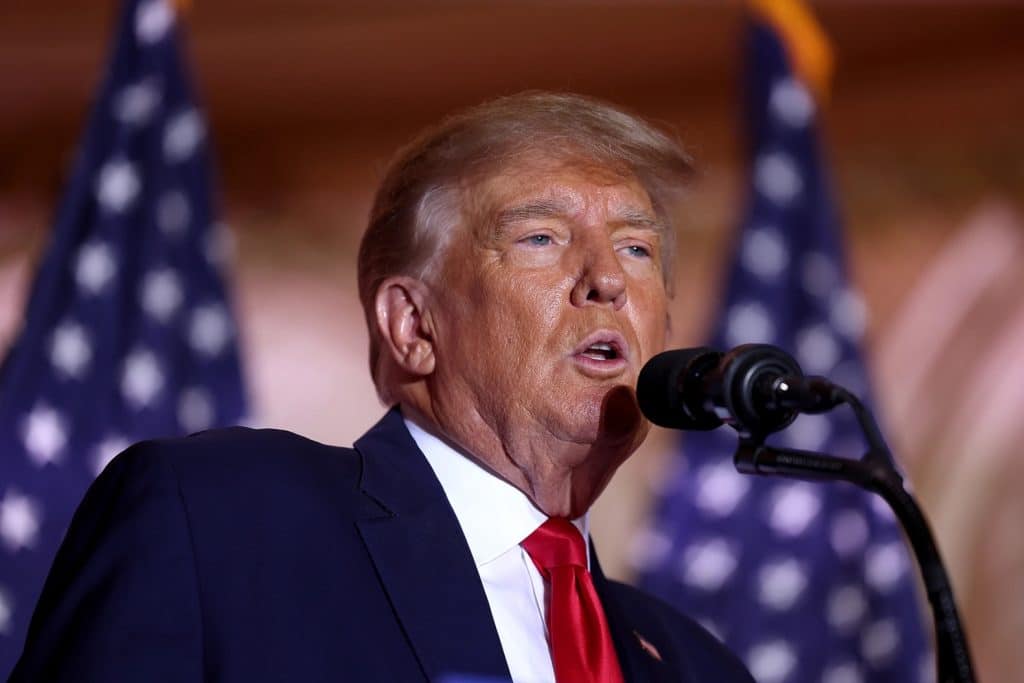Before the dust had settled on the 2022 midterms, and with some races yet to be called, Donald Trump announced his third bid for president. It marked the start of the 2024 election cycle.
Speaking from Mar-a-Lago, where just three months earlier FBI agents raided the estate looking for classified documents, Trump’s kickoff speech was a fever dream of his greatest hits from 2016 mixed with a delusional montage of his four years in office — complete with claims of having ruled “without wars for decades,” a declaration that the invasion of Ukraine “would never have happened” under his watch, and the promise of “making it to Mars.” He ignored the over one million dead as a direct result of his murderous COVID-19 policies. As if the decades-long decline of the U.S. empire had only transpired in the last two years as Joe Biden long-blinked through meetings between heads of state, Trump bragged that his time in office showed a global hegemon “ready for its golden age” at the “pinnacle of power, prosperity, and prestige, towering above all rivals.”
Trump begins his campaign well in advance of the primary season, in no small part as a defense against the many lawsuits and legal proceedings against him. He filed papers for a presidential run much earlier than anyone else in history, most likely in the hopes that it can forestall potential prosecution.
Putting the absurd to the side for a moment, however, Trump’s speech showed a revitalization of his right-wing populist message, coupled with a virulently reactionary social platform and strongman protectionist international agenda. Though not a departure from his two previous campaigns, Trump doubled down on directing his discourse to the U.S. working class — specifically those who feel that the political establishment sold them a bill of goods and left them behind. Even as he repeated venomous, racist remarks against immigrants, made horrific attacks on trans people, railed against the Black Lives Matter movement, and reviled teaching about racism in schools, he attempted to speak to the losers of globalization and neoliberalism as part of a “unified” vision where we all “need to be friends.”
Like the Democrats and the rest of the Republicans this midterms cycle, Trump’s rhetoric foreshadows a 2024 election that will be focused on winning over the working class, which has come to the fore of the political arena in a context of an economy and regime in crisis and a resurgence in the labor movement and pro-labor sentiment. Despite his clumsy attempts at “both sides” pandering, however, Trump rededicated himself in his speech to the worst right-wing aspirations of his base and showed that he stands resolutely against the issues that matter to the hundreds of millions of working and poor people in the United States. He made it clear that four more years of Trump would mean nothing other than further attacks on their living conditions to bolster the profits of big business and the legitimization of the Far Right.
His third run at the Oval Office comes at a time when Trump himself is in a weakened position — not just after having lost the 2020 elections, but after a midterm cycle where most of his high-profile endorsees lost their elections to moderate Democrats. This is not to downplay the number of Trump supporters and ultra-reactionary figures who still make up a sizable number of government officials at both the state and federal level: Trump candidates gained a number of posts this cycle, including Senatorial seats in Ohio and North Carolina, where polarization won out and Republican candidates sailed to victory in now-solidified red states. While Trump may enter the 2024 race on the back foot, it’s clear that the Far Right is here to stay, a symptom of the deep political crisis that the United States faces in the waning days of its global hegemony.
But overall, these midterms showed an electorate thirsty for stability, and Trump-like “outsider” candidates like TV reporter Kari Lake in Arizona and TV personality and animal abuser Mehmet Oz in Pennsylvania lost their races. Without an appealing vision of how to combat inflation (in a post pandemic-relief world, blaming social spending for the economy tanking didn’t seem to go over well with voters), the GOP had a poor showing against the Democrats and Biden, who leaned into fears about abortion and saving democracy while in key races taking up some aspects of the right’s rhetoric against the Green New Deal, the police, and China. Indeed, even Trump had to moderate his discourse around certain issues in his announcement — he never mentioned the “pro-life agenda” in his hour-long ramble, and he even toned down his references to stolen elections.
If the lack of establishment figures attending the announcement was any indication, Trump launched his campaign with fewer allies than in 2020. Looking for someone to blame for the “red wave” that never was, much of the Republican Party establishment is pointing the finger at Trump for throwing his weight behind candidates who alienated moderates. Notably, Trump has lost the support of Rupert Murdoch and his media empire, who has said he will not back another Trump run; this culminated in the dramatic moment of Fox News cutting away from Trump’s announcement mid-sentence. At the level of wealthy capitalist donors, Axios reports that Stephen A. Schwarzman, the chairman, CEO, and co-founder of finance supervillain Blackstone will not back Trump’s run either. Even his own daughter is trying to distance herself from another Trump campaign.
Indeed, Trump throws his hat into the ring at a moment where the identity crisis of the GOP is in full view and his own success as a candidate is far from assured. Governor Ron DeSantis of Florida is well-positioned after his midterm blowout, with Florida further cemented as a red state. Republicans prefer DeSantis by 10 percentage points compared to Trump for 2024. But this early in the game it remains to be seen who else will enter the ring to challenge Trump and who will rise to the top to represent the Republican Party and sectors of capital betting on the GOP’s vision of resolving the crisis of U.S. hegemonic decline.
Nevertheless, Trump won’t let himself be ignored, and the agenda he put forward in 2016 and 2020 will guide the 2024 primaries and elections. Indeed, though his candidates underperformed in the midterms, “Trumpism” very much pushed the elections to the right this year. Democrats moved to the right on issues from China to immigration to climate change, and although Republicans were forced to avoid endorsing the political turmoil of the 2020 elections and January 6, they did not completely disavow Trump himself.
Trump’s Mar-a-Lago speech highlighted the issues that dominated the midterms and will likely dominate the GOP primaries: immigration, law and order, and the “culture wars” against the rights of trans people, Black and Brown people, and women in particular. Trump leaned heavily into the promise of giving more freedom to the repressive arm of state to brutalize workers, particularly people of color, as well as “cracking down” on immigration by threatening the lives of immigrants and using the United States’ imperialist control over the Mexican government to do it. Not to be outdone by Ron DeSantis and the like, he also promised to end the “gender insanity” of basic rights for trans people and to send in the National Guard to repress protests and dissent.
Beyond the ultra-reactionary bluster that will no doubt mobilize his base to the polls (and the streets), guiding Trump’s speech was a picture of the United States in crisis. He appealed directly to those hit by inflation: “To every worker struggling to survive, this campaign is for you.” He called on teachers, construction workers, and firefighters to elect him and return the United States to a mythical past of prosperity. He brought back his pledge to “drain the swamp!” of the political caste, promising a constitutional amendment to set term limits for elected officials, as well as a ban on taxpayer funding of campaigns and a lifetime ban on lobbying by former members of Congress and cabinet members.
But behind every promise that “every policy must help the American worker” is the reality that Trump did govern and would govern again in favor of “every business both big and small to allow our nation to compete with other nations.” True to his right-wing bonapartist positioning, Trump is attempting to hoodwink the American working class into supporting his vision of how to keep the capitalist class on top domestically and internationally in the face of a deep structural and political crisis. If his four years in the White House are any indication, at the top of his agenda are tax breaks for the wealthy, attacks on unions, investing heavily in fossil fuels on American soil, and shaking up international alliances in the hopes of offering U.S. corporations a better position when it comes to China. His policies are unequivocally anti-worker.
The Democratic Party will no doubt use Trump’s announcement to bolster its own electoral prospects and to further its agenda in Congress, with a House that is likely to go to the Republicans. It will hide its own lack of alternatives – shown in the doubt around a potential Biden 2024 run – under the guise of fending off Trump at all costs, even as the party panders to Trump’s base, moving to the right on the issues that matter to the working class and oppressed.
Fending off Trump and the Far Right — not just in 2024, but in the long term as the historic crisis of neoliberalism reaches new heights — will require overcoming the logic of lesser evilism and building an alternative for working and oppressed people that does not settle for the crumbs offered to us by the capitalist class while it launches much more brutal attacks against our living standards. Beyond the elections, we need our own political force that will defend our rights while fighting for everything that we deserve: for a union and living wage for every worker, for free abortion and healthcare on demand, for an end to violent borders and police repression, and more.
As the bipartisan regime continues its gridlock, Trumpism will attempt to paint itself as a way out and the Democrats will paint themselves as the last defense against the ultra-Right. Yet the only thing that can truly unify the demands of the working class and oppressed with our renewed energy to fight for our interests on our own terms, is a party that will harness that spirit in the streets using our own methods — not protests as pressure campaigns on capitalist politicians, but strikes and mass mobilization to shut down the economy we already run to win our demands and stamp out the threat of the Right.











